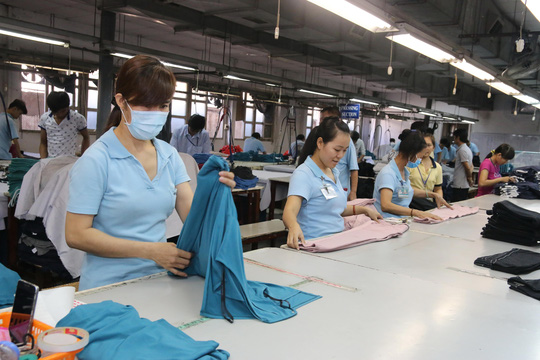Unemployment may rise because of the high numbers of unskilled workers and increased industrial automation.
The issue was discussed at the forum about policies and employment held by the International Labour Organisation and the Ministry of Labour, Invalids and Social Affairs on December 13 in Hanoi.
Deputy Minister Dao Hong Lan emphasised that globalisation and scientific and technological developments were posing huge challenges to the local economy.
Statistics show that as of this year, only 11.21 million out of 54.36 million workers have some sort of vocational qualification. The number of workers trained for jobs in science and technology are low, and Vietnam lacks skilled and experienced workers. In 2013, Vietnam's productivity was only 5.6% of Singapore’s, 8.3% of Japan and 15.2% of Malaysia’s.
Textiles, leather and footwear along with car parts are Vietnam's export strength. However, Vietnam Chamber of Commerce and Industry Chairman Vu Tien Loc said these sectors were being threatened. A Chinese factory recently replaced 60,000 workers with robots and in Japan, 16,000 shops are entirely automated.

Textiles, leather and footwear along with car parts are Vietnam's export strength
Loc said Vietnam must improve technology, but maintain employment.
Dao Thi Thu Huyen from Canon Vietnam Company said they had 13,000 workers six to seven years ago but the number had reduced to 8,000 with automation. "86% of workers may lose jobs and three-quarters of workers in car component manufacturing could be replaced with robots," she said.
A survey by the Institute of Labour Science and Social Affairs pointed out that 50% of firms don't forecast which skills are needed in the future and 38% don't have close link with vocational schools or other training facilities.
David Lamotte, deputy director of International Labour Organisation in the Asia-Pacific said Vietnam must improve its human resource quality via collaboration between policy makers, employers and training facilities.
Deputy Minister Dao Hong Lan said, "We must invest in human resources. Employers must work with research institutes to change management methods."
She went on to say students should wisely choose their career to avoid redundant sectors.
Nguyen Thien Ly, deputy director of May 10 Corporation hoped to have government support to train skilled workers.
Mai Duc Chinh, deputy chair of the Vietnam Labour Federation, said the unions were considering the possibility of setting up a fund to re-train female workers.
Dtinews






